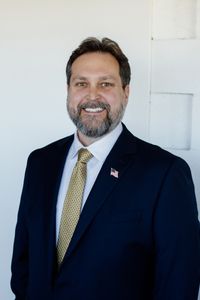Wayne Stiles
Candidate, U.S. House Michigan District 1
Elections and appointments
Education
Personal
Contact
Wayne Stiles (Democratic Party) is running for election to the U.S. House to represent Michigan's 1st Congressional District. He declared candidacy for the Democratic primary scheduled on August 4, 2026.[source]
Stiles completed Ballotpedia's Candidate Connection survey in 2025. Click here to read the survey answers.
Elections
2026
See also: Michigan's 1st Congressional District election, 2026
General election
The primary will occur on August 4, 2026. The general election will occur on November 3, 2026. Additional general election candidates will be added here following the primary.
Democratic primary election
Republican primary election
Endorsements
Ballotpedia is gathering information about candidate endorsements. To send us an endorsement, click here.
2026
Ballotpedia survey responses
See also: Ballotpedia's Candidate Connection
Wayne Stiles completed Ballotpedia's Candidate Connection survey in 2025. The survey questions appear in bold and are followed by Stiles' responses.
Expand all | Collapse all
Wayne Stiles is a U.S. Congressional Candidate for Michigan's 1st Congressional District. An unapologetic Catholic, Industrial Designer, Entrepreneur and Small Business owner. Wayne was raised in West Michigan and earned a BFA degree from the University of Michigan. Wayne lives and works in Traverse City, MI.
- Defend Democracy
Our democracy is the foundation of our freedom, and it must be protected. I will fight to ensure fair and secure elections, protect voting rights, and keep big money and corporate influence out of politics. Defending democracy means making government accountable to the people—not special interests—and standing up against efforts to erode trust in our institutions.
- Fight for everyday hard working Americans
Too often, Washington forgets about the people who keep our communities running—teachers, farmers, small business owners, and working families. I will fight to lower costs, raise wages, and make sure hard work is rewarded with opportunity and dignity. My focus will always be on policies that strengthen the middle class, protect good jobs, and ensure that everyday Americans—not the wealthy and well-connected—are at the center of our government’s priorities.
- Restore the American Dream
Every generation should have the chance to build a better life than the one before—but too many families today feel that dream slipping away. I will work to restore the American Dream by expanding opportunities for good-paying jobs, making education and healthcare more affordable, and ensuring safe, thriving communities for our loved ones. Together, we can rebuild hope and opportunity so that every family has the chance to succeed.
I am personally passionate about expanding the middle class and restoring stability and common sense to our political system. A strong middle class is the backbone of our economy and democracy, and we need policies that create good-paying jobs, lower costs, and open opportunities for working families. At the same time, I believe it is vital to bring a modicum of sanity back to our politics—reducing division, focusing on practical solutions, and putting people ahead of partisanship.
The most important characteristic for an elected official is integrity. Without it, trust between representatives and the people they serve cannot exist. Integrity means being honest, transparent, and consistent in both words and actions, even when it is difficult or unpopular. An official who leads with integrity puts the interests of their constituents above personal or political gain, ensuring decisions are made fairly and in the public’s best interest.
To serve as a true representative of the people, ensuring that the voices and concerns of Northern Michigan and the Upper Peninsula are heard on the national stage. This means listening closely to constituents, advocating for their needs in Congress, and working to secure policies and resources that reflect the unique challenges and strengths of the region. Ultimately, the role is about faithfully carrying the priorities of the district to Washington while maintaining accountability and transparency to the people back home.
The U.S. House of Representatives is unique as the larger chamber of Congress, with 435 members apportioned by population, making it closely tied to the principle of “one person, one vote.” Its two-year terms keep representatives accountable to voters, and it holds exclusive powers to originate revenue bills and impeach federal officials. With centralized leadership and stricter rules than the Senate, the House can act quickly but often in a more partisan way, making it a distinct body closely linked to the people.
I do not believe previous experience in government or politics is necessary to serve effectively as a representative. In fact, bringing in individuals from outside the political establishment can offer fresh perspectives, new ideas, and a closer connection to the everyday challenges citizens face. Too often, career politicians become disconnected from the people they represent, while newcomers can approach problems with practicality and common sense rather than partisan habits.
One of the greatest challenges for the United States over the next decade will likely be strengthening and preserving its role as a global leader in democracy. Domestically, this involves addressing political polarization, protecting election integrity, and ensuring that democratic institutions remain trusted and effective. Internationally, it requires demonstrating that democratic governance can deliver stability, prosperity, and fairness in the face of rising authoritarian influence around the world. Meeting this challenge will depend on the nation’s ability to rebuild civic trust at home, uphold the rule of law, and engage in diplomacy that promotes democratic values abroad.
I do not believe two years is the right term length for representatives. A two-year term is too short to accomplish much, as representatives are forced into a near-constant campaign cycle. Extending the term to three years would provide more time to focus on governing, building relationships, and advancing meaningful legislation, while still keeping members accountable to the voters.
Term limits are necessary because elected office was never intended to be a lifelong career. Serving in Congress should be about representing the people, not building decades-long political power. I would advocate for a three-term limit for representatives, which would help prevent the rise of entrenched “career politicians.” By regularly bringing in new voices and perspectives, term limits could refresh the political system, encourage innovation, and keep leaders more connected to the concerns of everyday citizens.
Yes. I look to leaders like Senator Carl Levin, Representative Bart Stupak, and Attorney General Dana Nessel as models. Each demonstrated a strong commitment to public service and to representing the people of Michigan with integrity, accountability, and dedication. Their work shows the importance of listening to constituents, standing firm on principles, and ensuring that government works for everyday people.
One memorable and impactful stories I’ve heard came from the teachers and principal at Grand Marais, Michigan. They described how their island school was struggling to stay open because it no longer fit within the state’s funding formula, and they were pleading, for opportunities to keep it alive. What struck me most was not only their passion for their school and community but also how the national partisan divide had filtered down into their small community, creating conflict over an issue that should unite them. It was a powerful reminder of how political divides can devastate small towns, and how much is at stake when it comes to supporting local schools and communities.
Yes—compromise is both necessary and desirable for policymaking because it helps bridge differences, prevents gridlock, and produces laws that are more widely accepted and lasting in a diverse democracy like the United States.
Since the Constitution requires all revenue bills to originate in the House, this power would play a central role in my priorities by working toward a fair tax code. That means ensuring the tax system is balanced, transparent, and designed to support working families and small businesses rather than favoring only the wealthy or special interests. Using this constitutional authority responsibly is essential to creating an economy that works for everyone.
The House should use its investigative authority to establish facts, protect the public interest, and hold officials and institutions accountable—not for spectacle or partisan scorekeeping. Because the Constitution gives the House the sole power to impeach, investigations that uncover credible evidence of “high crimes and misdemeanors” must be pursued carefully and thoroughly. Beyond impeachment, the House also has a responsibility to root out wrongdoing at its source and prevent it from eroding the foundation of our democracy.
I’m proud to be the first in my family to earn a college degree, the first to start my own business, and now the first to run for public office. My path has not always been easy—I’ve learned many lessons from the school of hard knocks—but those experiences have made me resilient and determined. I’ve also learned to accept help from those around me and to lean on experts in their fields. With those experiences, I am determined and steadfast in achieving the goals I set for myself. And with compassion and understanding, I believe I can be the best representative for our district.
We need to embrace the future, and artificial intelligence is a big part of it. AI can free people from mundane tasks, spark creativity, and open new opportunities for exploration and innovation. The U.S. government should help prepare the workforce by investing in training and education, while also protecting human rights and integrity. At the same time, smart regulation will be needed to manage challenges like energy consumption and ensure AI is used responsibly. This is a watershed moment for humanity, and government has a responsibility to guide AI’s growth so it benefits society as a whole.
I would support legislation that modernizes and strengthens our democracy. That includes building secure systems that allow citizens to vote conveniently, such as from their phones, while maintaining election integrity. I also believe we must overturn Citizens United and get corporate money out of politics by setting strict campaign spending limits and replacing big-money donations with public funding for campaigns under rigorous scrutiny. These reforms would make our elections more accessible, fair, and accountable to the people—not wealthy donors or special interests.
Note: Ballotpedia reserves the right to edit Candidate Connection survey responses. Any edits made by Ballotpedia will be clearly marked with [brackets] for the public. If the candidate disagrees with an edit, he or she may request the full removal of the survey response from Ballotpedia.org. Ballotpedia does not edit or correct typographical errors unless the candidate's campaign requests it.
Campaign finance summary
 Note: The finance data shown here comes from the disclosures required of candidates and parties. Depending on the election or state, this may represent only a portion of all the funds spent on their behalf. Satellite spending groups may or may not have expended funds related to the candidate or politician on whose page you are reading this disclaimer. Campaign finance data from elections may be incomplete. For elections to federal offices, complete data can be found at the FEC website. Click here for more on federal campaign finance law and here for more on state campaign finance law.
Note: The finance data shown here comes from the disclosures required of candidates and parties. Depending on the election or state, this may represent only a portion of all the funds spent on their behalf. Satellite spending groups may or may not have expended funds related to the candidate or politician on whose page you are reading this disclaimer. Campaign finance data from elections may be incomplete. For elections to federal offices, complete data can be found at the FEC website. Click here for more on federal campaign finance law and here for more on state campaign finance law.
See also
External links
Senators
Representatives
Democratic Party (8)
Republican Party (7)


 = candidate completed the Ballotpedia Candidate Connection survey.
= candidate completed the Ballotpedia Candidate Connection survey. = candidate completed the Ballotpedia Candidate Connection survey.
= candidate completed the Ballotpedia Candidate Connection survey. = candidate completed the Ballotpedia Candidate Connection survey.
= candidate completed the Ballotpedia Candidate Connection survey.













